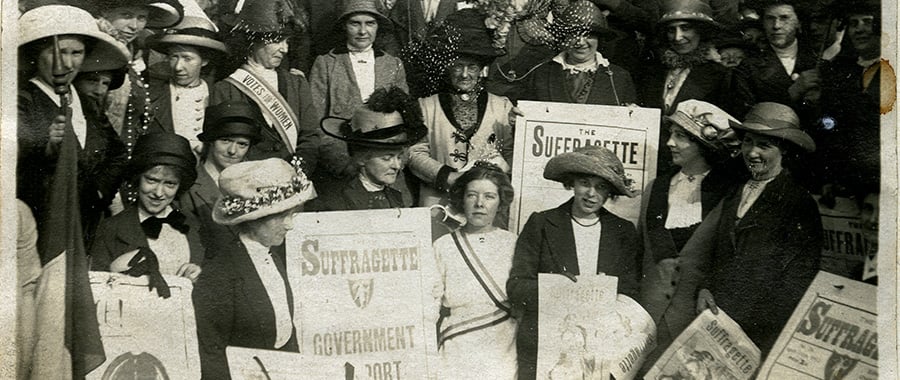
The Rebel Cause: 100 years of Women’s Right to Vote
This is a historic time for women.
The 6th of February 2018 marks the 100th anniversary of the Representation of the People Act, 1918. This legislation enabled women over the age of 30 to vote for the first time and paved the way for universal suffrage ten years later. It was the catalyst for several significant milestones on the track towards democratic equality.
The year also sees the 60th anniversary of the Life Peerages Act 1958 in April, which permitted women to sit in the House of Lords for the first time, and the centenary of the Parliament (Qualification of Women) Act 1918 in November, an act which allowed women over the age of 21 to stand for election as an MP.
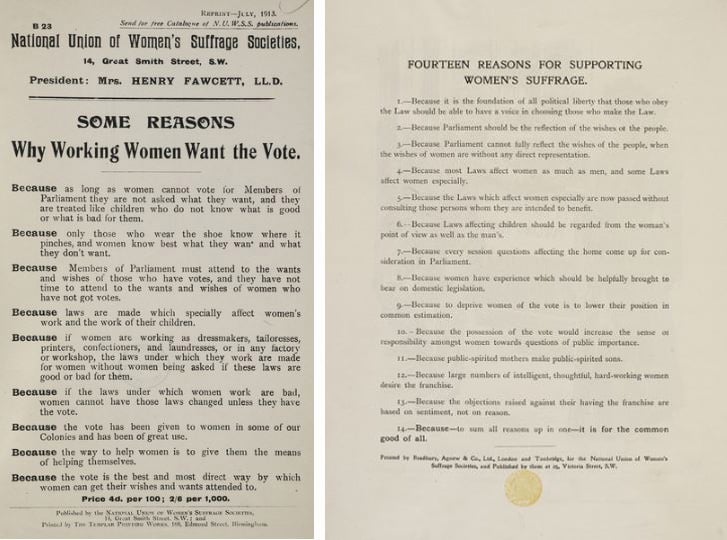
Articles supporting Women’s Suffrage / British Library, London, UK / © British Library Board. All Rights Reserved / Bridgeman Images
At the time, these noble women fighting for their parliamentary rights were condemned as rebels. Well, they set fire to houses and churches and slashed valuable portraits in galleries… they were indeed rebels.
“I would rather be a rebel than a slave.” – Emmeline Pankhurst
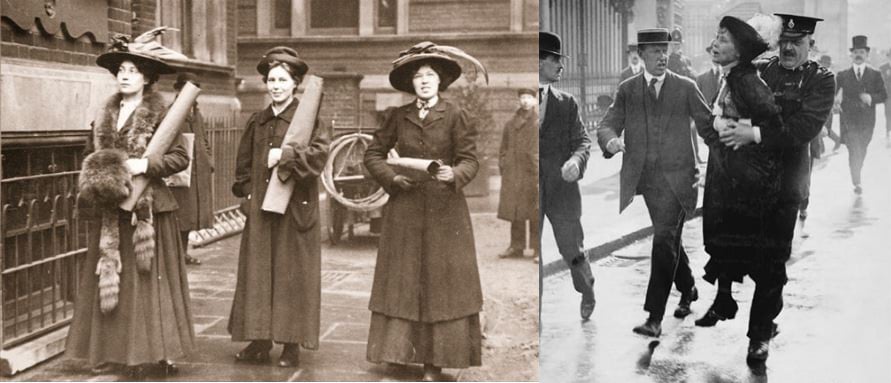
Left: Suffragettes armed with materials to chain themselves to railings, 1909 (sepia photo), English Photographer / The Stapleton Collection / Bridgeman Images; right: Emmeline Pankhurst (1857-1928) being arrested by Superintendent Rolfe while trying to present a petition to the King at Buckingham Palace, 21st May 1914 (b/w photo), English Photographer / Museum of London, UK / Bridgeman Images
Changing a system so ingrained in society arguably required dramatic action. Whether it was through peaceful placarding or grueling hunger strikes, or even the events that led to the death of Emily Davison on the race track in 1913, these ladies were determined to have their voice heard.
“Now all we need is to continue to speak the truth fearlessly, and we shall add to our number those who will turn the scale to the side of equal and full justice in all things.” – Lucy Stone
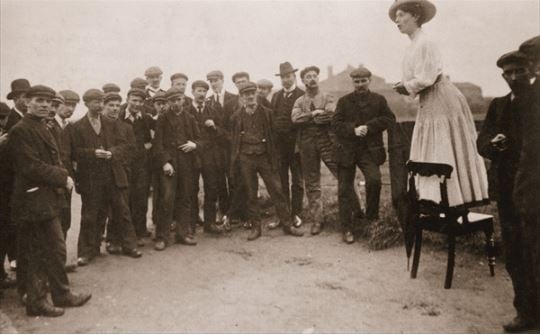
Una Dugdale campaigning at the Newcastle by-election, September 1908 (sepia photo), English Photographer / Private Collection / The Stapleton Collection / Bridgeman Images
Present-day women are motivated to fight for numerous causes…
From the #metoo campaign to #timesup, women are embracing the challenge to influence their future and disrupt social conventions. We’re enforcing measures to make the gender pay gap illegal, we’re calling out body shamers and we’re bringing down prominent sexual abusers. We’re uniting to march in millions across seven continents against misogynists and rallying against those that disrespect the female gender, particularly those in positions of power.
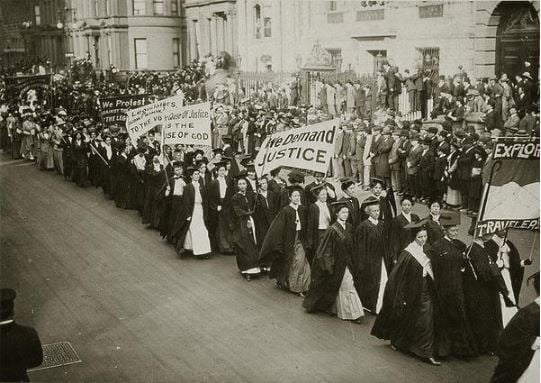
Women in academic dress marching in a suffrage parade in New York City, 1910 (b/w photo), Jessie Tarbox Beals (1871-1942) / Schlesinger Library, Radcliffe Institute, Harvard University / Bridgeman Images
You could say that all of this began with the determination of the female activists that founded the suffrage movements and related parties, including the work of the WSPU and NUWSS, or more specifically the Pankhurst family, Millicent Fawcett, Susan B. Anthony, Elizabeth Cady Stanton, Alice Paul, Lucretia Mott, Lucy Stone, Lucy Burns, Ida B. Wells-Barnett and Carrie Chapman Catt, to name but a few.
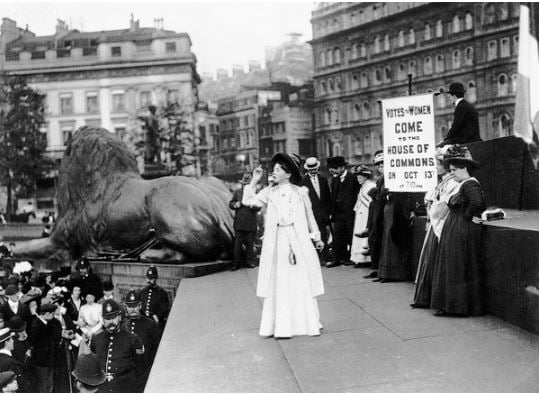
Christabel Pankhurst (1880-1958) speaking in Trafalgar Square, October 1908 (b/w photo), English Photographer / Museum of London, UK / Bridgeman Images
Calendar of commemorative events in 2018
Celebrate and discover more about women’s history of law-breaking and law-making with a selection of events across the UK:
- 27 Jan – 13 May 2018. Votes for Women, National Portrait Gallery.
- 2 Feb 2018 – 6 Jan 2019. Votes for Women, Museum of London.
- 6 Feb. Deeds Not Words Lantern Parade, Berkeley Square to City Hall, Bristol.
- 1-31 March 2018. Wonder Women 2018, City-wide in Manchester.
- 2 June – 3 Feb 2019. Represent! Voices 100 Years On, People’s History Museum.
- 10 June. Processions, Belfast, Cardiff, Edinburgh, London.
- 27 June – 6 Oct 2018. Voice and Vote: Women’s Place in Parliament, Houses of Parliament.
- 30 June. Votes for Women, M Shed, Bristol.
- Various dates. A Vote of Her Own – 100 Years of Women’s Suffrage, Oxford Playhouse.
- Year-round. Women and Power. Nationwide at selected National Trust properties.
- Until 31 Dec 2018. A Woman’s Place, Abbey House Museum, Leeds.
“I always feel the movement is a sort of mosaic. Each of us puts in one little stone, and then you get a great mosaic at the end.” – Alice Paul
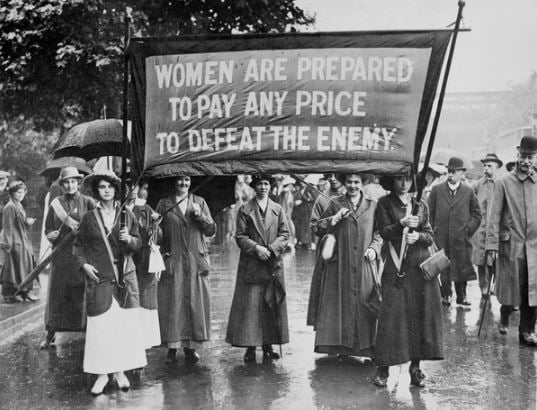
WSPU ‘Right to Serve’ march to demand work in munitions, 1915 (b/w photo), English Photographer / Private Collection / Bridgeman Images
Find out More
Related content on the blog:
- 8 March: International Women’s Day
- Vintage Suffrage Posters
- 7 Iconic Moments in the History of the Royal Academy
- Art Scandals: Our Top Five
- Strong Women In History
Get in touch at uksales@bridgemanimages.com for research or licensing queries.
